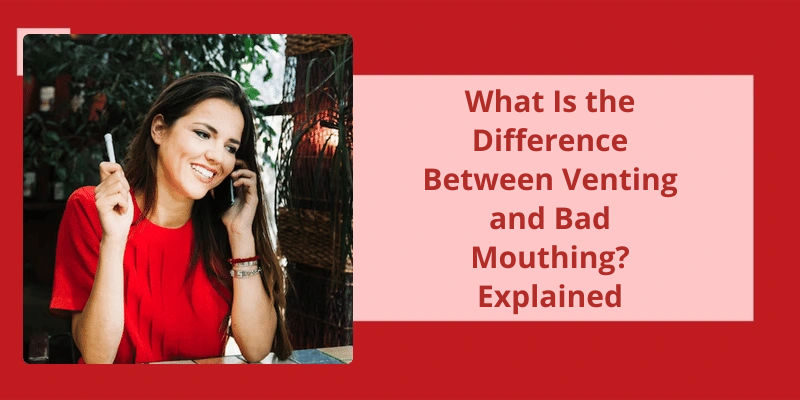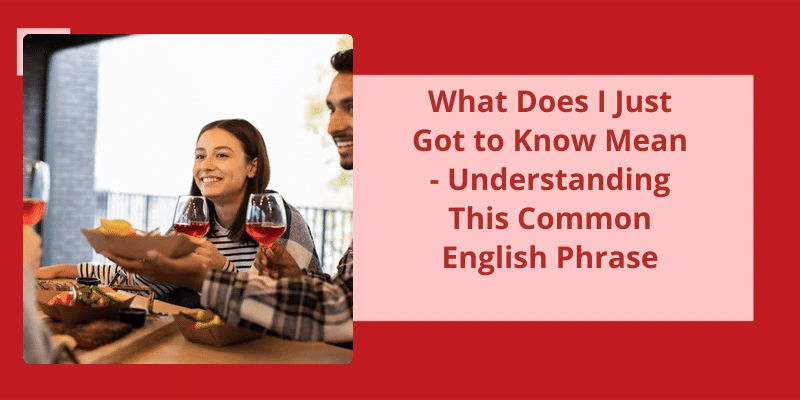As humans, we all experience emotions and encounters that leave us feeling frustrated, angry, or hurt. In these moments, it's natural to seek an outlet to express ourselves and release some of the pent-up tension. However, there's a fine line between venting and bad-mouthing, and it's essential to understand the distinction between the two. While venting can be a healthy coping mechanism, bad-mouthing can be toxic and damaging to both the person being spoken about and the speaker. In this article, we'll explore the nuances between venting and bad-mouthing and why it's crucial to be mindful of how we choose to express our negative emotions.
What Does Vent Mean in Mental Health?
The purpose of venting is to release pent-up emotions and feelings that one may be bottling up. It’s a way for individuals to express their frustrations or concerns about a particular situation or issue. This exchange can lead to practical solutions and problem-solving techniques.
However, venting can also be harmful if it isn’t done in a healthy way. Additionally, if the listener isn’t supportive, it can lead to further isolation and distress. It’s important for individuals to choose their venting partners wisely and ensure that they’re supportive, empathetic, and actively listen.
While venting and ranting may seem similar, there’s a key difference between the two concepts. While both involve expressing one’s thoughts and emotions, the intensity and duration of the expression are what sets them apart. Venting is a healthy way to process emotions and let go of frustrations, while ranting can quickly spiral into unproductive and negative behavior. In this article, we will explore the differences between venting and ranting and offer tips for effectively managing both.
What Is the Difference Between Venting and Ranting?
Venting and ranting are two common ways of expressing oneself that are often used interchangeably. While they may appear similar, there are distinct differences between the two. Venting is a healthy way of expressing emotions, particularly negative ones. It allows individuals to let off steam, gain clarity on their emotions, and move on. On the other hand, ranting is an excessive and often exaggerated way of complaining that can be counterproductive.
It might involve taking some time to collect ones thoughts or speaking to a trusted friend in a private setting. Ranting, on the other hand, is often more impulsive and uncontrolled. People who’re ranting may struggle to regulate their emotions and may find it difficult to stop once they get started. As a result, they may end up making things worse by saying things they don’t mean or escalating a situation unnecessarily.
By understanding these differences, people can develop healthy ways of expressing themselves and managing their emotions.
How to Differentiate Between Healthy Venting and Problematic Ranting, and Identify Warning Signs That You May Be Crossing the Line.
- Healthy venting involves expressing emotions in a constructive manner.
- Problematic ranting involves expressing emotions in a destructive manner.
- Warning signs that you may be crossing the line into problematic ranting include:
- Intense and prolonged anger or frustration.
- Personal attacks or insults directed towards others.
- Ongoing negative self-talk or self-blaming.
- Feeling a sense of relief from verbally attacking others.
- To differentiate between healthy venting and problematic ranting, try to:
- Express your emotions clearly and calmly.
- Avoid attacking or blaming others.
- Focus on finding solutions instead of just venting.
- Take breaks and give yourself time to calm down before expressing your emotions.
Source: What’s the difference between ranting/venting about …
It’s important to understand the distinction between venting and talking behind someone’s back, as these two actions can have vastly different consequences. While venting can be a healthy way to process emotions and gain perspective on a situation, talking behind someone’s back can be harmful and disrespectful to the person being discussed. In the following sections, we will explore the differences between these two actions in greater detail, and offer tips on how to navigate challenging situations while still maintaining respect and integrity.
What’s the Difference Between Venting and Talking Behind Someone’s Back?
While both may involve sharing feelings about someone else, venting and talking behind someones back are very different. Venting is an important part of socializing and can help us examine our emotions and navigate difficult situations. When we vent, we usually try to identify the source of our frustration or anger and work towards a solution to the problem. This can be done with trusted friends or family members who we know will listen without judgment and who we can trust to offer support and practical advice.
Talking behind someones back, on the other hand, is often done with the intent of hurting someone else or gossiping. It’s the process of sharing information with people who werent meant to hear it and can be damaging to the person being discussed.
The key difference between the two lies in the intent. It’s about problem-solving and seeking support from trusted individuals without the intent to harm anyone.
It’s important to be aware of the difference between these two behaviors so that we can foster positive communication habits that bring people together instead of pushing them apart.
How to Handle Situations When Someone Is Venting to You
When someone is venting to you, it’s important to listen without interrupting or judging them. Let them express themselves fully and validate their feelings. Avoid giving unsolicited advice or trying to fix their problems. Instead, offer your support and empathy. If the situation requires further action, discuss potential solutions together.
Conclusion
It’s crucial to be mindful of our words and actions and strive to communicate our emotions in a constructive and respectful manner. By doing so, we can maintain healthy relationships and create a positive impact on those around us.






